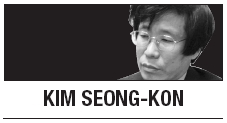Americans are well known to seek clinical therapy when they encounter psychological problems. In fact, American culture, as well as the social system, encourages people to seek therapy for all kinds of issues. For example, if you have an uncontrollable temper, you may be directed to anger management classes. If you have issues with your spouse, you and your spouse will be advised to try marriage counseling.

If you are a widow or widower grieving over a deceased spouse, you may be told to try therapy to heal your emotional wounds. And if you are an alcoholic or drug addict who is still recuperating, you may be sent to group therapy. Indeed, America is a haven for counseling and therapy.
Although I do not discount the significance and importance of professional help, I find it perplexing that counseling and psychiatry are widely practiced in a country that stresses the importance of individuality and independence.
Americans are well known as do-it-yourself fanatics. Why do they not, then, deal with their private psychological issues alone and try to overcome them independently? Why do so many people depend on counselors and psychiatrists to solve their personal problems? Does the American spirit of individuality and independence not apply to personal problems? In addition, is it not true that group therapy contradicts American individualism and independence? Undoubtedly, it is healthy to discuss your psychological problems, since emotional catharsis is essential.
I wonder, however, if people find it embarrassing to disclose personal issues to a stranger, especially since Americans are raised to value individuality and autonomy.
In his book on American fiction, “City of Words,” Tony Tanner points out that quite a few protagonists in late 20th-century American fiction narrate their stories while lying on their psychiatrist’s couch. The British scholar from Cambridge notes that it seems to be common for Americans to discuss their emotional burdens with their psychiatrist. In foreign eyes, this culture of frequent therapy may seem frivolous, since some Americans seek professional help for even trivial matters. Besides, habitually depending on your shrink may weaken your independence.
According to a statistic released by the U.S. government, approximately 10 percent of the country’s population visited psychiatrists last year. It is unsurprising that psychiatric and counseling practices have been flourishing in American society, since an increasing number of people depend on these services. Meanwhile, due to this uniquely American phenomenon, psychiatrists seem to make a lot of money in exchange for listening to patients’ complaints and providing tips from time to time.
In contrast, psychiatry has never taken off in Korean society, even though there are a considerable number of people who need therapy. Korean people seldom resort to professional psychiatric help even when their symptoms are quite serious. It seems, generally speaking, that Koreans find it embarrassing to disclose their secrets to a stranger. Rather, many Koreans prefer to discuss their secrets and problems with their best friend. If someone does not have a best friend, the person usually deals with his or her issues alone. Although you may be able to release stress by sharing your ordeals with a friend, a friend cannot offer professional help. As a result, there are quite a few mentally distressed people at large on the streets and college campuses of South Korea. Since counseling and therapy sessions are relatively scarce in Korea, many who need help are overlooked. Some of these people commit suicide, and others commit crimes and harm others. While in America, some people go to counseling for even trivial issues, in Korea, many who desperately need help go without it.
Korea is well known as being a group-oriented society and yet, group therapy sessions are ironically quite rare. Traditionally, Korean society emphasizes the importance of community spirit and group-oriented activities, and arguably much more than in the West. For example, the importance of the individual is indicative of the fact that in English, “I” is capitalized when referring to the self.
In Korean, however, you must frequently use the modest word “jeo,” which means “humble me,” when referring to the self. In addition, Koreans often hide themselves behind a community or a group by using “we/our” instead of “I/my.” For example, instead of “my house,” “my school” and “my father,” Koreans always say “our house,” “our school” and “our father.”
When experiencing psychological and emotional issues, however, Koreans suddenly find themselves all alone. There are few group sessions or therapy centers that come to your rescue when you suffer a psychological crisis in Korea. You are totally on your own and need to cope alone. That is, there is no longer “we” when you have psychological issues in Korea; there is only “me” cast in the relentless reality. Thus, you must survive any ordeal all by yourself.
Perhaps an ideal solution can be found somewhere between the two extremes, between the American and Korean systems. Once again, we should learn from each other to find a better solution for our psychological problems.
By Kim Seong-kon
Kim Seong-kon is a professor of English at Seoul National University and president of the Literature Translation Institute of Korea. He can be reached at sukim@snu.ac.kr. ― Ed.





![[Exclusive] Hyundai Mobis eyes closer ties with BYD](http://res.heraldm.com/phpwas/restmb_idxmake.php?idx=644&simg=/content/image/2024/11/25/20241125050044_0.jpg)

![[Herald Review] 'Gangnam B-Side' combines social realism with masterful suspense, performance](http://res.heraldm.com/phpwas/restmb_idxmake.php?idx=644&simg=/content/image/2024/11/25/20241125050072_0.jpg)
